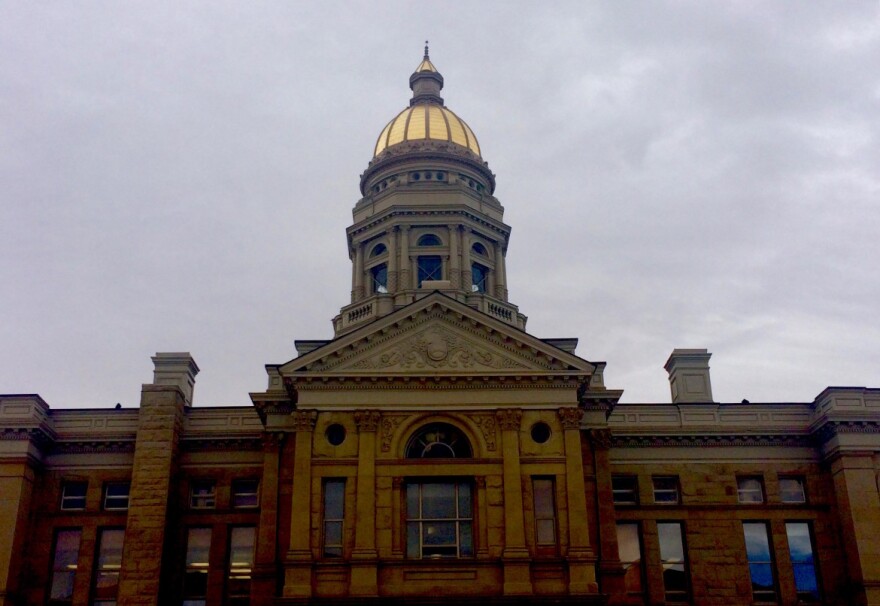The last time the state of Wyoming executed someone was in 1992.
"When that execution actually occurred, I felt it," said Sen. Cale Case. "And people all over Wyoming felt it, 'cause we were part of it."
The Republican lawmaker was speaking earlier this month in favor of a bill to end capital punishment in Wyoming. The bill, however, went on to fail on the Senate floor by just eight votes.
About a decade ago, that kind of margin in this conservative legislature was unimaginable to Rep. Cathy Connolly. It was in 2010 that the Democrat introduced a repeal bill. It was her first legislative session.
"It was a pretty partisan issue, and not even all Democrats believed in the abolition of the death penalty," she said.
Needless to say, her legislation didn't get anywhere that year. This year, 12 Republicans sponsored a bill to end execution alongside Connolly and one other Democrat. But conservatives taking on the issue of capital punishment isn't unique to Wyoming.
"There's been a sea change in death penalty attitudes in the United States," said Robert Dunham, who leads the non-partisan Death Penalty Information Center.
"We've seen this shift among people whose philosophy is pro-life," he said. "We've seen a shift among people whose philosophy is limited government, and they see the extension of government to the point of taking somebody's life as the ultimate exercise of big government."
While about three-quarters of Republicans say the death penalty is applied fairly, repeal bills sponsored by GOP lawmakers are becoming more common. Plus, more people on the left have joined the cause. And that makes for interesting timing.
"With an unparalleled level of polarization in American politics, this previously divisive issue is bringing people together," said Dunham.
Sabrina King is with the American Civil Liberties Union of Wyoming - one of many groups that has been pushing for the repeal for years now.
"It is interesting to see, even within our own coalition, the different reasons that people are involved. And it does run the gamut," she said.
It basically comes down to two different arguments - the moral cost and the fiscal cost of state-authorized execution. Death penalty cases are significantly more expensive for a number of reasons, including longer trials, subsequent appeals and - for high profile cases - jury sequestration.
"The death penalty is far more expensive than any other sentence or component of the criminal justice system," said Kylie Taylor. She's the Wyoming coordinator for Conservatives Concerned about the Death Penalty.
"As conservative Republicans, we believe in fiscal responsibility, and especially right now with the way that our economy is in Wyoming," she said.
The state is facing an economic crisis. Even for its boom-and-bust history, it's a significant downturn. Still, that wasn't enough to get the bill passed this time, though the coalition is already gearing up to try again next session. Sabrina King with the ACLU said bridges the coalition has built could take them beyond this one particular issue.
"I do think the kind of relationships that get built when you do this work lend themselves to conversations about harder things," she explained.
For Rep. Cathy Connolly, she said the conservative support for repeal is a long time coming. And as far as reaching across the aisle goes, Connolly said, it's why she's here.
"It's why I do the job that I do in a body that is a kind of a super majority," she said. "I believe in the system. I believe that we as a state, as a bipartisan body, that we can come up with solutions, and the only way we do that is by working together."
This story was produced by the Mountain West News Bureau, a collaboration between Wyoming Public Media, Boise State Public Radio in Idaho, KUNR in Nevada, the O'Connor Center for the Rocky Mountain West in Montana, KUNC in Colorado, KUNM in New Mexico, with support from affiliate stations across the region. Funding for the Mountain West News Bureau is provided in part by the Corporation for Public Broadcasting.
Copyright 2021 Wyoming Public Radio. To see more, visit Wyoming Public Radio.






